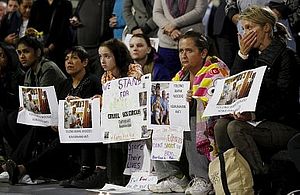The fallout from last week’s executions of convicted drug traffickers Andrew Chan and Myuran Sukumaran continues. Although relations between Australia and Indonesia are still strained, with the recall of the Australian ambassador, the most intractable problem may not be bilateral ties but domestic issues centering on police conduct.
A decade after the arrests in Bali of Chan, Sukumaran, and the other seven members of the so-called Bali 9, questions about the initial handling of the case by the Australian Federal Police (AFP) persist. In the wake of the executions on Wednesday morning, critics like barrister Bob Myers have attacked the AFP, charging that the agency may be ultimately responsible for the deaths.
The problem is that the agency informed Indonesian police of the actions of the Bali 9, with full knowledge that Indonesia could impose the death penalty for drug trafficking. A parliamentary inquiry into the matter will be held in coming weeks, according to Australian media.
Myers has been involved with the case from the beginning, as it was he who tipped off the AFP about one member of the group, Scott Rush, at the behest of the 19-year-old’s father, who was a friend. Myers said he asked the agency to stop Rush, or at least warn the teenager, while on the way to Bali from Australia. The agency denies it ever agreed to do this. Instead, that day they wrote to the Indonesian police asking them to gather intelligence on the group and take what actions they saw as appropriate. Later, the AFP tipped off their Indonesian counterparts, alerting them to the nine’s flight plans from Bali’s Denpasar to Australia. The rest is well known. The would-be smugglers were searched and heroin was found. Soon after that a very public trial began.
Ever since these details were revealed there has been one question: Why do this when under Indonesian law those caught trafficking drugs face the death penalty? Even now, there is no real answer despite the legion of investigative news reports, questions in parliament, and allegations by anti-death penalty activists. There will apparently be a Senate hearing this month after the budget is announced.
Clive Palmer, leader of the Palmer United Party, is planning to introduce a private member’s bill along with Victorian independent Member of Parliament Cathy McGowan to the lower house that would see any official who discloses information that could bring about the execution of Australians overseas facing jail sentences ranging from one to 15 years.
Former Minister for Justice and Customs Chris Ellison, in power when the nine young people were arrested at Denpasar Airport, said that the agency was operating under its guidelines for cooperating with international law enforcement bodies. “If it had allowed the transaction to happen in Indonesia that could well have damaged relations as well.”
Myers has spoken out after the executions, calling it a “black day” for the AFP. “They deliberately exposed nine Australians to the death penalty.”
The day the two were executed, The Australian wrote that the Justice Minister Michael Keenan in 2014 scrapped what the newspaper calls a “specific requirement” that the agency “take account of the government’s longstanding opposition to the application of the death penalty in performing its international liaison functions.”
Labor minister David Feeney, who is the Opposition Justice spokesman, wrote to his Liberal counterpart Michael Keenan asking him to reinstate the key reference and asked why no explanation for its dropping has been forthcoming. Foreign Minister Julie Bishop has attacked Labor for trying to score cheap political points.
Though Keenan did not explain he did say, among other things, ““It is vitally important that we continue to co-operate with our law enforcement partners including Indonesia throughout the region. The reason we do that is because it keeps Australia safe… We do have very strict guidelines about dealing with information in relation to death penalty cases.”
The specific death penalty requirement was brought in in 2009 under former Australian Prime Minister Kevin Rudd to further ensure more Australians would not be unnecessarily exposed to the risk of execution.
Helen Clark was based in Hanoi for six years as a reporter and magazine editor. She has written for two dozen publications including The Diplomat (as Bridget O’Flaherty), Time, The Economist, the Asia Times Online and the Australian Associated Press.

































